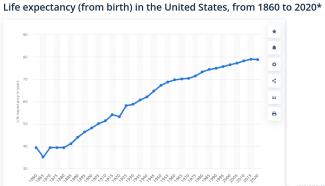
Life Expectancy, Social Security & Retirement
Happy New Year! We hope that you enjoyed the festive season and time with family. As we begin another year it is worth reflecting on our good fortune that we are living in an era of remarkable advances in health care that have prolonged the average lifetime. In 1875, the average life expectancy in the USA was 40 years old. By 1960 (85 years later) the average life expectancy in the USA was 69.77years and in 2019, it was 78.79 years. Life expectancy has almost doubled since 1875. It has fallen since 2020 due to the increase in mortality rate resulting from COVID and currently stands at 77.28 years in 2022. Men typically on average have a lesser lifespan reaching approximately 74 years of age whereas women on average live to about 80 years. As medicine advances at an exponential rate with the convergence of quantum computing, biotechnology, genomics, regenerative medicine, research and many other related disciplines, the pace at which healthcare is advancing is accelerating and we can expect the average life expectancy to keep rising alongside these advances.
This is, of course good news for human beings but it also means we need to plan for living longer. As we live through the great inflation since the advent of COVID and a challenging bear market, it's important to revisit retirement plans on a regular basis and re-calibrate if needed to realize the retirement you are planning for.
An important factor that will influence your retirement income are social security benefits and the age you start claiming them.It is important to understand the financial implications of when you choose to claim social security. For example, it is estimated that overall benefits, on average, will be approximately 76% higher (inflation adjusted) if you start claiming social secuirity at the age of 70 versus the age of 62. That may be counter-intuitive but when you factor in the early-retirement reduction penalty and conversely the delayed retirement credits (DCR's) that increase your retirement by 8% per annum for each year through the age of 70, this is not the case. Only 7% of all retirees wait to claim social security until the age of 70 despite this.
There are many good reasons why people chose to claim social security when they do. One such reason may be frequent media reports that social security will need to be cut in the next decade as it will not have sufficient funds to pay out to a growing population of retirees. Why wait to claim social security if your benefits might be cut. While this is only rhetoric at this juncture it would be naive to not consider this potential risk. It is prudent to factor in the risk of possible cuts to social security. Whenever you choose to claim benefits be sure to know and weigh the opportunity costs so you can take this into account in your calculations and decision making.
While financial planners must work with actuarial tables and averages, the lifespan we will each reach is an individual matter determined by genetics, health, exercize, diet and a myriad of other factors.
Planning for retirement is a complex dynamic process with key variables in constant flux such as changes in the law of trusts, the economy, inflation, interest rates, market cycles, longer lifespans and a plethora of domestic and international living options that provide a large variance in costs of living that can accomodate different budgets and lifestyle choices.
Having an experienced financial advisor at your side who understands the complexity of the variables and how to work with them, can make the journey a lot safer and smoother.

